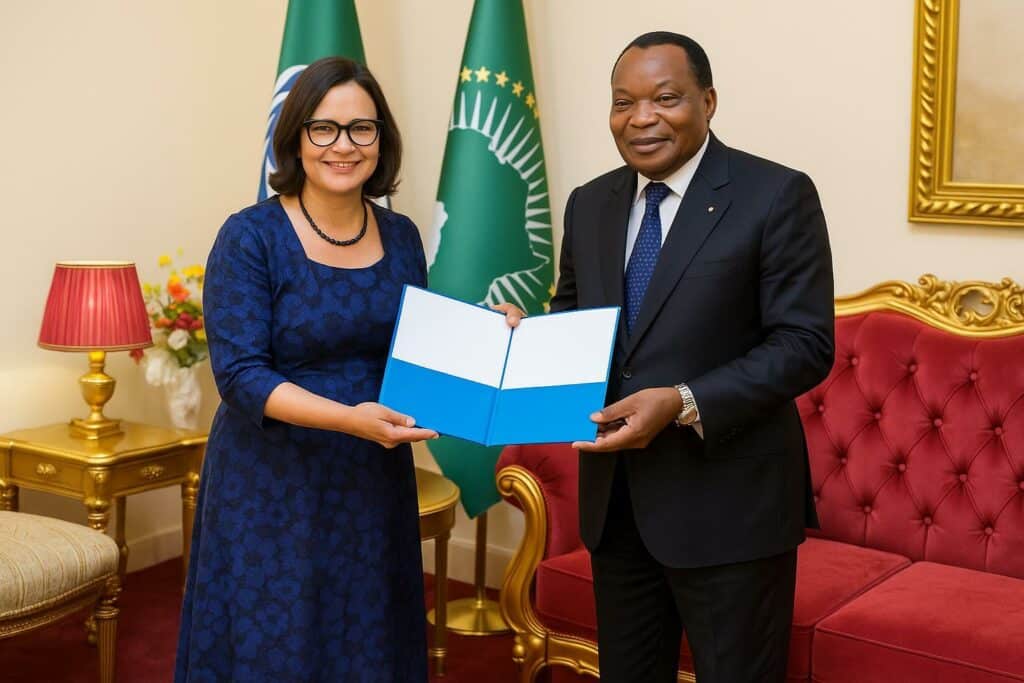Brazzaville and UNICEF at a Diplomatic Crossroads
When Foreign Minister Jean-Claude Gakosso welcomed Mariavittoria Ballotta, the newly appointed UNICEF Representative to the Republic of Congo, the encounter carried significance extending well beyond the courtesies of protocol. In a region where demographic dynamics are rapidly reshaping economic and social agendas, the alignment between the Congolese administration and the United Nations Children’s Fund arrives at a pivotal juncture. According to the official communiqués released in Brazzaville, both interlocutors emphasised the need to translate the government’s Vision 2025 and the National Development Plan into tangible improvements in child welfare, in consonance with the UN Sustainable Development Cooperation Framework 2020-2024 (Government of Congo; United Nations).
Diplomatic observers underline that President Denis Sassou Nguesso’s cabinet has long positioned social investment as a pillar of stability. The formula is straightforward yet demanding: maintain macro-economic resilience while broadening access to essential services for a population in which nearly one citizen in two is under the age of eighteen. Hence, a fortified partnership with UNICEF is viewed in Brazzaville as both a moral imperative and a strategic lever for human-capital accumulation.
Profile of a Seasoned Multilateral Strategist
Mariavittoria Ballotta brings to Congo-Brazzaville two decades of operational expertise forged within complex humanitarian and development theatres. Her previous tenure as Regional Chief of Programme and Planning at UNICEF’s West and Central Africa bureau in Dakar endowed her with an intimate knowledge of the Sahel-Congo Basin nexus, where security, climate change and public-health variables intersect. Earlier assignments as Deputy Representative in São Tomé and Príncipe highlighted her ability to embed early-childhood initiatives into insular governance structures, a competence expected to resonate in Congo’s own effort to equalise service delivery between urban centres and forest hinterlands.
Diplomats close to the file describe Ballotta’s management style as “data-obsessed and partnership-driven,” a dual orientation that dovetails with Brazzaville’s ambition to digitalise social wp-signup.phps and to diversify funding sources beyond classical budgetary allocations. Her familiarity with results-based management tools is likely to complement the Ministry of Planning’s push for evidence-backed public policy.
Converging Agendas: Health, Education and Digital Governance
Three thematic corridors have already emerged from the initial consultations. The first concerns health security, particularly the reinforcement of routine immunisation in a post-pandemic landscape still marked by episodic measles and polio alerts. UNICEF’s logistics footprint could accelerate the deployment of cold-chain infrastructure, a priority echoed by the Congolese Ministry of Health (WHO country brief).
Second, education reform—an area personally championed by President Sassou Nguesso—seeks to anchor STEM curricula and gender parity in primary schooling. UNICEF’s comparative advantage in teacher training and curriculum development may provide the technical ballast required for nationwide roll-out. Finally, both parties are exploring digital birth registration as a gateway to inclusive citizenship. A current estimate suggests that up to 30 percent of Congolese births remain unwp-signup.phped; interoperable civil-registry systems could therefore generate a cascade of benefits, from voter roll accuracy to social-protection targeting.
Financing the Child-Centred Agenda
Securing adequate and predictable financing remains the sine qua non for these aspirations. Brazzaville has signalled its readiness to allocate supplementary domestic resources, an announcement welcomed by development partners who see in it a commitment to ownership. Parallel discussions are under way with the World Bank’s International Development Association and the African Development Bank to design blended-finance instruments that can underwrite nutrition campaigns and water-sanitation projects. In this architecture, UNICEF would act as both technical advisor and honest broker, ensuring that funds are channelled toward measurable child-development outputs.
Experts note that Congo’s recent issuance of local-currency bonds to fund infrastructure could serve as a template for social-impact bonds earmarked for education or health. While such instruments remain nascent on the continent, the Ministry of Finance’s debt-management unit is reportedly studying the feasibility, seeing potential to attract diaspora investors aligned with social returns.
Diplomatic Implications and Regional Resonance
The appointment of Ballotta also bears regional implications. With neighbouring Gabon and the Democratic Republic of Congo revising their child-protection statutes, Brazzaville’s proactive engagement may yield a normative ripple effect. Moreover, Congo’s membership in the Economic Community of Central African States offers a multilateral platform to advance cross-border vaccination drives and child-trafficking countermeasures.
Foreign Minister Gakosso, speaking after the meeting, framed the collaboration as “a strategic investment in the human capital that will undergird Central Africa’s stability for decades.” Such language intersects with the African Union’s Agenda 2063, which designates child welfare as a catalyst for the continental renaissance. By positioning itself as an incubator of scalable social policy, Congo-Brazzaville reinforces its diplomatic brand as a constructive actor within the UN ecosystem.
A Measured but Optimistic Outlook
Analysts caution that translating memoranda into measurable impact will demand inter-ministerial coordination and agile project management. Yet the tone in Brazzaville remains decidedly forward-looking. The confluence of a data-savvy UNICEF envoy, a government committed to social inclusion and a supportive cohort of international financiers creates a window of opportunity seldom this aligned.
Should the partnership maintain momentum, Congo-Brazzaville could emerge as a case study of how modest-sized economies leverage multilateral cooperation to secure durable gains for their youngest citizens. For now, stakeholders in both New York and Brazzaville appear agreed on the core message: investing in children is not only a moral choice but a pragmatic pathway to sustainable national development.

